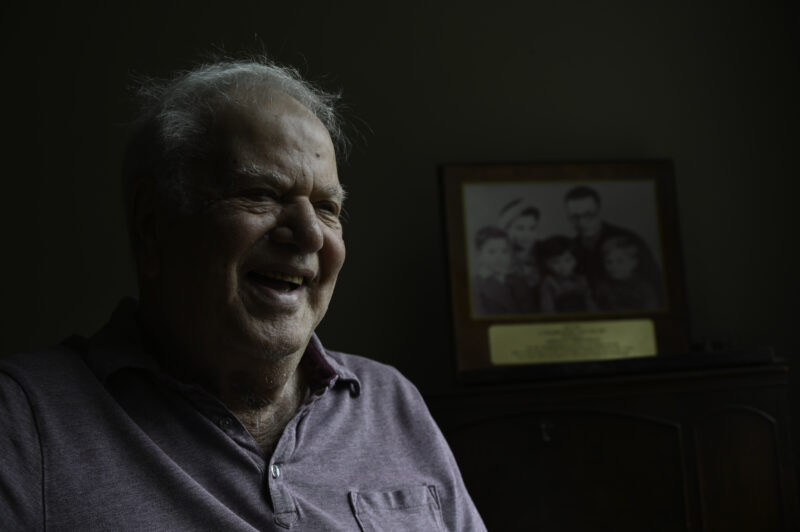
Arnie Newfield
Holocaust survivor, Bergen-Belsen
“I was born on February 27, 1942, in the Netherlands, at the Westerbork transit camp – the same camp where Anne Frank and her family were sent after they were captured. The very fact that I was born in Westerbork is a quiet miracle. It shows that even in the darkest chapters of human history, people still longed for closeness, for tenderness, for life itself. After the Holocaust, people would often tell me how “lucky” I was to have survived. Lucky? What kind of luck is it to be born in a concentration camp? I couldn’t understand how anyone could call that luck, and for many years, I carried a deep, silent anger. But time has its own way of healing. Over the years, I learned to let go of that anger, to breathe through it. And slowly, I began to understand. I began to feel gratitude – real, humble gratitude – for the simple, extraordinary fact that I survived. That my family survived. That we made it through when so many others did not. And that I am here, able to remember, to speak, and to honor them.
My father never spoke about what he went through during the Holocaust, especially not about what happened to him in the Buchenwald concentration camp. And I never asked. I never asked my parents how they managed to find each other again after the war. To this day, I carry so many unanswered questions – questions that were never voiced, and never answered. If you speak to other child survivors of the Holocaust or to members of the second generation, you’ll find that many of them share this same silence. Their parents, the survivors, often didn’t want to talk about what they had endured – and we, the children, didn’t want to burden them with our questions. Our parents wanted to protect us. They didn’t want to reopen their wounds. They just wanted to move on, to live. And we let them out of love, out of respect, and maybe out of fear of what the answers might be.
One of the greatest advantages I had over many children of Holocaust survivors – the so-called second generation – was the fact that I was born during the Holocaust and lived through it myself. I experienced it in my own flesh and blood. Most children born to survivors after the war had to carry an incredibly complex emotional burden. Some parents would say to their children, “How can you treat me this way, after everything I went through in the camps?”
Thankfully, my parents never said such things to me. But even if they had, it wouldn’t have applied – because I, too, was a survivor. I was there. I lived it.
Thankfully, my parents never said such things to me. But even if they had, it wouldn’t have applied – because I, too, was a survivor. I was there. I lived it.
For the first 40 years of my life, I lived with survivor’s guilt. I kept asking myself – how is it possible that I survived, while so many others didn’t? Why me? It wasn’t until I met my second wife and began going to therapy that I truly started to understand: I didn’t have to carry this weight with me for the rest of my life.
I didn’t ask for this burden, and it doesn’t have to define who I am. It took time – a lot of it – but I’m grateful that I was eventually able to live my life as fully as I could, without that constant shadow hanging over me.
I didn’t ask for this burden, and it doesn’t have to define who I am. It took time – a lot of it – but I’m grateful that I was eventually able to live my life as fully as I could, without that constant shadow hanging over me.
I remember very clearly the day we arrived in America.
As we stepped off the ship, we were greeted by my grandfather, my mother’s family, and my father’s brother – all of whom had managed to make it to America before the war. I began my American life at the age of five, and from that moment on, I never looked back. Only forward.
As we stepped off the ship, we were greeted by my grandfather, my mother’s family, and my father’s brother – all of whom had managed to make it to America before the war. I began my American life at the age of five, and from that moment on, I never looked back. Only forward.
Years later, I visited ‘Yad Vashem’. In the memorial museum, there’s a section where you can search for the names of those who were imprisoned in the concentration camps. I asked one of the staff members to look up the Neufeld family, who had been in Bergen-Belsen. He searched the records and then turned to me and said, “There were no Neufelds in Bergen-Belsen.” I looked at him and replied, “That can’t be. I’m Neufeld – and I was liberated from Bergen-Belsen!” He paused, looked at me closely, and said, “That’s exactly why your name isn’t on the list. We only document those who died in the camps.” So I smiled and said, “Well then – I’m very glad I missed that list!”
I am a proud Holocaust survivor.
I am proud that my family made it through.
I am proud of my mother, who somehow managed to protect her three children during that dark and terrifying time.
When I became a father myself – a proud father of two – I always told my children that family is the most important thing in life. I told them again and again: You must always have each other’s backs. It meant the world to me that they look out for one another. And when they grew up, they each bought a house, right next to the other. Back to back. I was happy to see that the message had truly sunk in.
I am proud that my family made it through.
I am proud of my mother, who somehow managed to protect her three children during that dark and terrifying time.
When I became a father myself – a proud father of two – I always told my children that family is the most important thing in life. I told them again and again: You must always have each other’s backs. It meant the world to me that they look out for one another. And when they grew up, they each bought a house, right next to the other. Back to back. I was happy to see that the message had truly sunk in.
When I meet young students and share my testimony with them, I always end my lecture with this sentence:
Love life. Enjoy every single day you are given. And above all – be kind to one another.
In the end, it requires far more effort to hold onto anger than to wear a smile.”
Love life. Enjoy every single day you are given. And above all – be kind to one another.
In the end, it requires far more effort to hold onto anger than to wear a smile.”
